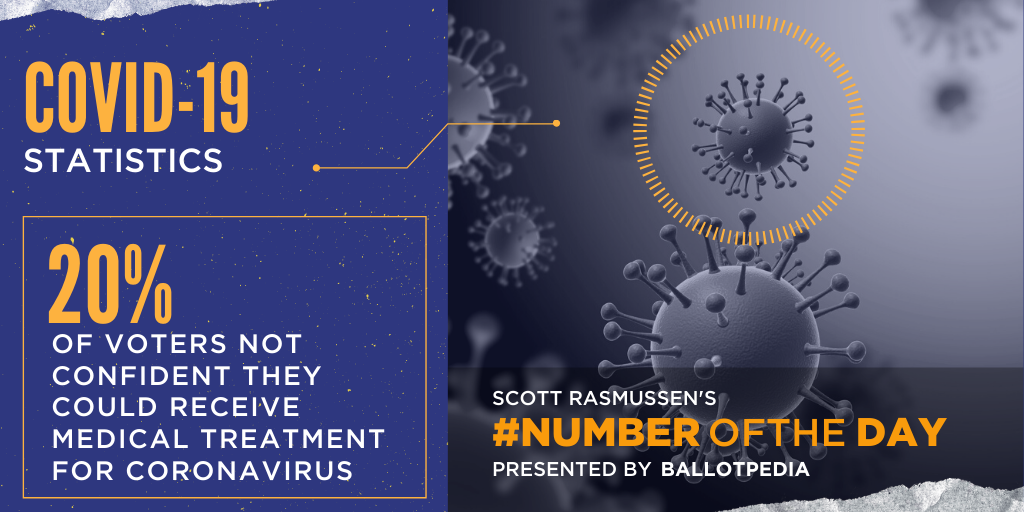Each day, we:
- Track the status of reopening in all 50 states.
- Compare the status of one industry or activity across the country.
- Provide in-depth summaries of the latest reopening plans.
- Give you the latest stories on other reopening plans and ideas.
Want to know what happened yesterday? Click here.
The next three days
What is reopening in the next three days? Which stay-at-home orders will expire?
May 30
- Idaho (Republican trifecta): Gov. Brad Little (R) announced the state will move into the third phase of reopening starting May 30. Phase Three will allow non-essential travel and gatherings of up to 50 people. Bars will be able to reopen. Movie theaters, which had been scheduled to reopen in Phase 4, will also be permitted to reopen that day.
May 31
- Maine (Democratic trifecta): Maine's stay-at-home order is scheduled to expire on May 31. Gov. Janet Mills (D) issued the original stay-at-home order on March 31. She extended it to last through May 31 on April 28.
- Texas (Republican trifecta): Gov. Greg Abbott (R) announced that fans can attend outdoor professional sporting events at 25% of a venue's capacity. Leagues will need to receive approval from the Texas Department of State Health Services before holding events with spectators. The order does not apply to indoor sporting events. Effective May 29, waterparks can reopen at 25% capacity.
June 1
- Delaware (Democratic trifecta): The state’s stay-at-home order, short-term rental ban, and out-of-state travel quarantines will be lifted on June 1. The state will begin Phase One of its reopening plan. Businesses reopening in this phase, including restaurants and retailers, will be limited to 30 percent capacity. Residents are required to wear face coverings in public. See the "Featured plan" section below for more details.
- Georgia (Republican trifecta): Bars, night clubs, professional sports, and amateur sports will be allowed to reopen in the state beginning June 1. Gatherings of up to 25 people will be allowed.
- Hawaii (Democratic trifecta): Hawaii and Maui counties will begin opening personal care services (like salons and barbershops) and dine-in services at restaurants starting June 1. Hawaii County will start opening places of worship on June 1 while Maui County is allowing in-person religious services starting May 29. Oahu County is beginning to reopen some types of businesses starting May 29, including barbershops, salons, and tattoo parlors.
- Indiana (Republican trifecta): Cass, Lake, and Marion counties will be allowed to enter into the third phase of the state's reopening plan on June 1. On May 27, Indianapolis Mayor Joe Hogsett (D) announced the city would begin a modified third-phase reopening effective June 1. Social gatherings of up to 50 people will be permitted, indoor dining can resume at 50% capacity, malls can expand to 75% capacity, gyms and fitness centers can open at 50% capacity, and personal service businesses (e.g., hair and nail salons) can resume by appointment only.
- Iowa (Republican trifecta): Outdoor performance venues, casinos, bowling alleys, amusement parks, skating rinks, skate parks, and outdoor playgrounds will be allowed to reopen at 50% capacity on June 1. Summer school activities, including baseball and softball, will also be allowed to resume.
- Kentucky (divided government): The following businesses will be allowed to reopen on June 1: auctions (33% capacity), auto/dirt track racing, aquatic centers, bowling alleys, fishing tournaments, fitness centers, state park lodges, movie theaters (33% capacity), and the Salato Wildlife Education Center.
- Minnesota (divided government): Restaurants and bars will be allowed to offer limited outdoor seating on June 1 (outdoor spaces can accommodate no more than 50 people at a time). Salons and barbershops will also be permitted to reopen on June 1 at 25% capacity.
- Mississippi (Republican trifecta): Gov. Tate Reeves’ (R) Safer At Home order will be replaced by a Safe Return order on June 1. The order will allow all travel to resume. It will also permit indoor gatherings of up to 20 people and outdoor gatherings of up to 50 people. If social distancing is possible, indoor gatherings of up to 50 and outdoor gatherings of up to 100 will be allowed. Ballparks, theaters, libraries, and museums will also begin opening June 1.
- Montana (divided government): The state will start the second phase of reopening on June 1. Phase Two allows restaurants, bars, breweries, distilleries, casinos, gyms, and pools to operate at 75% capacity if they maintain the physical distancing and sanitation protocols established in Phase One. Other venues like concert halls and bowling alleys can operate with reduced capacity under distancing guidelines. In Phase Two, residents are asked to avoid gatherings of more than 50 people unless social distancing can be maintained. Visitors to the state will not have to complete a 14-day self-quarantine.
- Oklahoma (Republican trifecta): Gov. Kevin Stitt (R) announced the state will enter Phase 3 of its reopening plan on June 1. Under Phase 3, businesses can resume unrestricted staffing at worksites, and businesses that had been required to operate by appointment can start accepting walk-in clients. Summer camps can reopen if they follow safety guidelines. Visitation at nursing homes and long-term care facilities will continue to be prohibited until further notice.
- Oregon (Democratic trifecta): Gov. Kate Brown (D) announced that Washington County will enter the first phase of reopening on June 1. In Phase 1, gathering sizes are limited to 25, and restaurants and bars can open for dine-in. Retailers, malls, personal service businesses (like hairdressers and salons), and fitness centers can also reopen, contingent on their compliance with state guidelines.
- Pennsylvania (divided government): Gov. Tom Wolf (D) announced that 16 more counties will enter the green phase of reopening and the remaining 10 red-phase counties are expected to move to yellow starting June 5. During the yellow phase, theaters and gyms remain closed, but some types of businesses, such as retail, can begin to reopen with restrictions. Bars and restaurants are limited to carry-out and delivery until June 5, when outdoor dining will be allowed in yellow counties. The green phase will allow most businesses and functions to reopen under state restrictions, including salons, barbershops, spas, casinos, theaters, malls, and gyms. Gathering limits will also be lifted in the green phase, but the state will continue to restrict large gatherings of over 250 people and visits to nursing homes and prisons.
- Rhode Island (Democratic trifecta): Gov. Gina Raimondo (D) announced the state will move into the second phase of reopening on June 1. Phase Two will allow personal service businesses (such as barbershops and salons), gyms, indoor dine-in services, indoor malls, and some outdoor entertainment activities to reopen. It will also lift the state’s travel restrictions and allow groups of up to 15 people to gather. Raimondo said Twin River Casino will be able to open later in Phase Two.
- Vermont (divided government): Gov. Phil Scott (R) announced that the limit on social gatherings will go up from 10 to 25 on June 1. On that day, several close contact businesses, including fitness centers, nail salons, and tattoo parlors, will be allowed to reopen at 25% capacity. Libraries, galleries, museums, and theaters will be allowed to reopen at 25% capacity, as well.
Since our last edition
Have any states opened? For a continually updated article on reopening status in all 50 states, click here. For our last edition, click here.
- Arizona (Republican trifecta): Gov. Doug Ducey (R) announced that schools would reopen in the fall and that the state would release guidelines to schools on June 1. Schools in the state have been closed to in-person instruction since March 15.
- Illinois (Democratic trifecta): The state's stay-at-home order expired on May 29, making it the 30th state to end a stay-at-home order. Illinois also started the third phase of its reopening plan, which allows non-essential retailers and manufacturers to begin reopening. Restaurants can also reopen for outdoor dining and gatherings of up to 10 people are allowed.
- Maryland (divided government): The following businesses and activities are allowed to reopen or resume on May 29: outdoor dining at restaurants and social clubs; outdoor youth sports and outdoor activities at youth day camps; drive-in movie theaters; and other outdoor activities.
- New Jersey (Democratic trifecta): Gov. Phil Murphy (D) announced that childcare centers would be able to reopen on June 15. Murphy also said outdoor, non-contact youth sports can resume starting June 22, and day camps can open on July 6.
- New York (Democratic trifecta): Gov. Andrew Cuomo (D) extended New York’s stay-at-home order until June 27. It will only apply to regions that have not met the state’s criteria to enter Phase One of reopening. New York City is the only region that has not advanced to the first phase, but Cuomo announced the city was on track to begin reopening starting June 8. The Finger Lakes, Mohawk Valley, Southern Tier, North Country, and Central New York regions were all cleared to enter Phase Two of reopening on May 29.
- Ohio (Republican trifecta): Gov. Mike Dewine (R) announced that assisted living facilities and intermediate care for developmental disabilities can allow outdoor visitations on June 8.
- Virginia (Democratic trifecta): On May 29, Northern Virginia, as well as Richmond and Accomack County, moved into Phase One of the “Forward Virginia” reopening plan. Face coverings are also required in public indoor settings statewide for people 10 years and older.
- West Virginia (Republican trifecta): Gov. Jim Justice (R) announced on May 29 that low-contact, outdoor youth sports practices can resume on June 8. Adult sports facilities, such as indoor tennis courts and outdoor basketball courts, can also reopen that day.
Update on stay-at-home orders
Forty-three states issued orders directing residents to stay home except for essential activities and the closure or curtailment of businesses each state deemed nonessential. Seven states did not.
As of May 29, stay-at-home orders have ended in 30 states. Eighteen of those states have Republican governors and 12 have Democratic governors (including Wisconsin, where the state Supreme Court invalidated the stay-at-home order). Of the 13 states with active stay-at-home orders, one has a Republican governor and 12 have Democratic governors.
Here's which stay-at-home orders have expired, and when the rest are scheduled to expire.
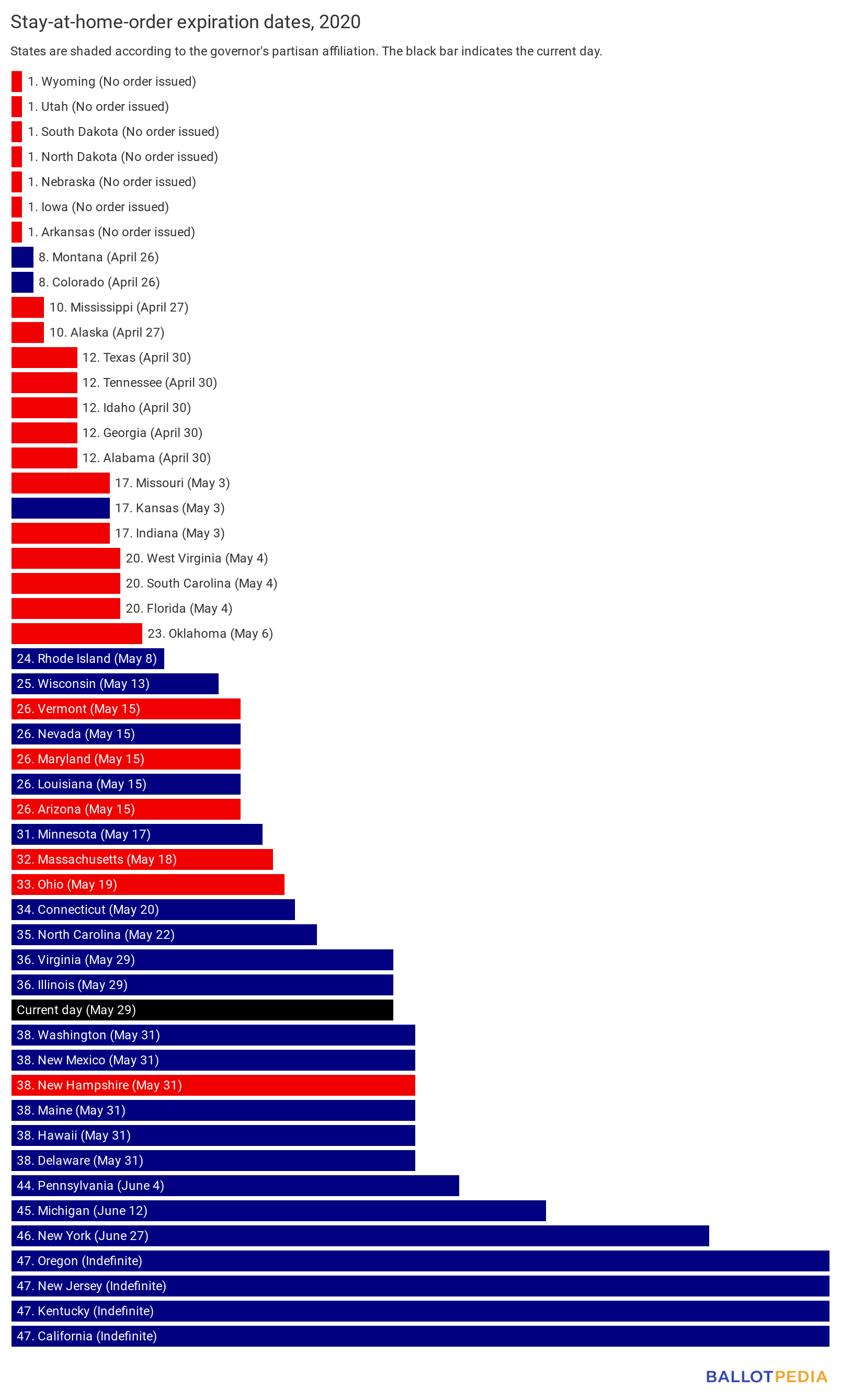
Tracking industries: Hotels
All 50 states began to reopen in some way. Here, we give the status of one industry or activity across the states. Today’s question: in which states may you stay in a hotel?
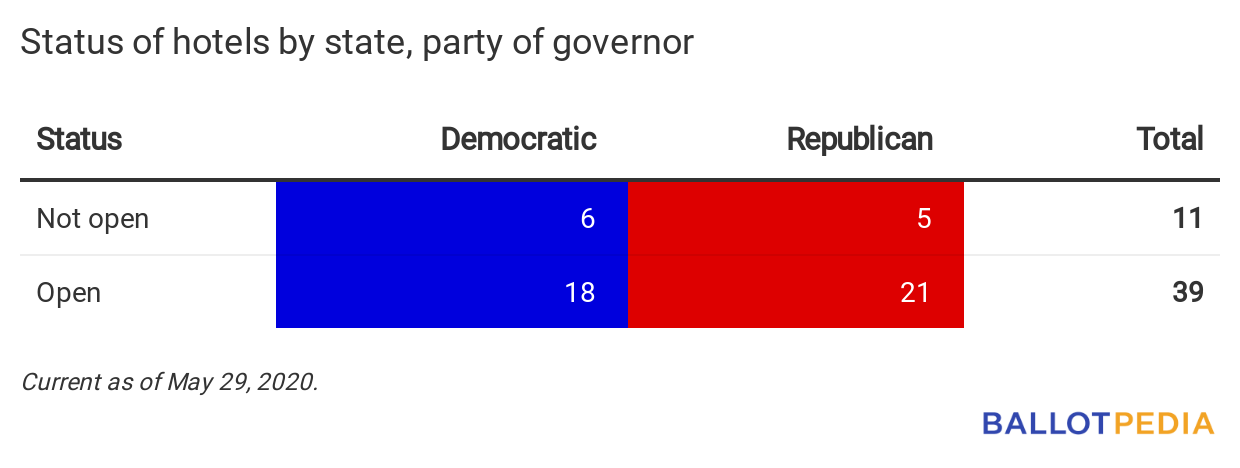 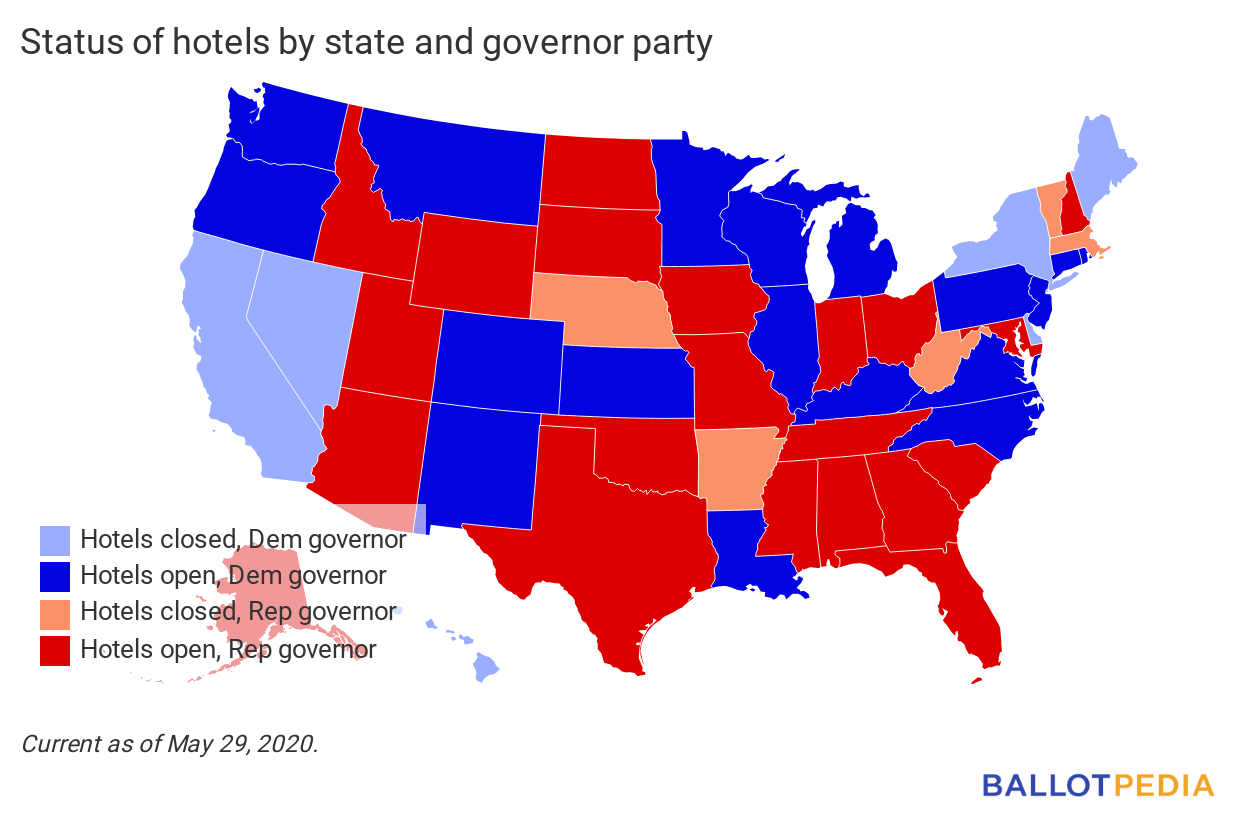
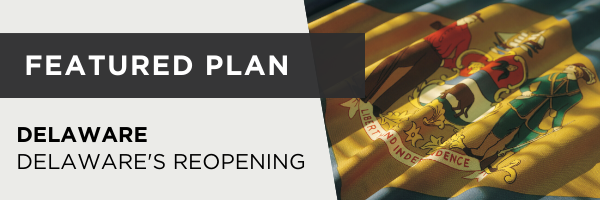
This is an in-depth summary of one of the latest reopening plans. Is there a plan you'd like us to feature? Reply to this email and let us know. Click a state below to read a previous Featured Plan.
Previous featured plans
On May 15, Gov. John Carney (D) released details of Phase 1 of the state's economic reopening, with general and industry-specific requirements for businesses allowed to reopen June 1. The state's stay-at-home order expires on May 31.
Carney said the state will follow the White House's guidance for determining when to begin reopening phases, including hospital capacity measures and a 14-day decline in cases. The governor's office said it will focus on the following as restrictions are lifted:
As of May 29, the governor's office had released details for Phase 1.
Local governments in Delaware may impose greater restrictions on businesses and individual activity than state restrictions.
Context
- Carney modified his state of emergency declaration to order nonessential businesses' physical locations to close and individuals to stay home except for essential activities starting on March 24. The stay-at-home modification requires individuals to follow social distancing and sanitation guidelines in shared spaces and during outdoor activity. The orders were set to expire on May 15. Carney extended them until May 31. On May 22, Carney issued a modification effective June 1 allowing Phase 1 businesses to reopen with certain guidelines.
- On April 25, Carney modified the state of emergency declaration to require individuals and employees to wear face coverings in certain settings. The order remains in effect until further notice.
- As of May 28, Delaware had 9,171 positive COVID-19 cases and 345 deaths. Delaware's estimated population as of July 2019 was 973,764. For every 100,000 residents, the state had 941.8 cases and 35.4 deaths.
- Delaware is a Democratic trifecta, with a Democratic governor and Democratic majorities in both chambers of the state legislature.
General guidelines for businesses and individuals
Guidance for individuals
| “ |
- Cloth face coverings must be worn in accordance with the State of Emergency Order.
- Individuals must regularly wash their hands according to Division of Public Health guidance, and must stay home when sick.
- At all times, individuals who are not part of a household should maximize physical distance from others and remain six (6) feet apart.
- All individuals, WHEN IN PUBLIC (e.g., parks, outdoor recreation areas, shopping areas), should maximize physical distance from others. Social settings of more than 10 people, where appropriate distancing may not be practical, must be avoided (e.g. receptions, trade shows).
- The number of individuals in a particular location will be strictly controlled in order to make sure that safe social distancing is maintained. Some of these limits are addressed for individual industries in the industry guidance, but where it is not otherwise stated, the upper limit is 30% of fire code occupancy (excluding staff).
- Non-essential travel should be avoided.
- ALL VULNERABLE INDIVIDUALS should continue to shelter in place. Members of households with vulnerable residents should be aware that by returning to work or other environments where distancing is not practical, they could carry the virus back home. Precautions should be taken to isolate from vulnerable residents.
|
” |
Vulnerable individuals are those over the age of 65 or those with underlying health conditions. For a list of conditions, see page 14 of the plan.
General business guidance
| “ |
- Employers should close COMMON AREAS where personnel are likely to congregate and interact, or enforce strict social distancing protocols.
- Employees and customers have a responsibility to self-quarantine if they have a reason to expect that they may be ill or may have come into contact with COVID-19. Employees who are symptomatic must not physically return to work until cleared by DPH or their medical provider.
- Employers are encouraged to continue to have staff work from home whenever possible. Employees who have been working from home throughout this crisis should continue working from home unless there is a substantive change to business operations in Phase 1 (e.g. a business was closed, but now it’s open).
- All surfaces touched by customers, including doors, restrooms, and point of sale infrastructure must be disinfected using an EPA-approved disinfectant every 15 minutes to 2 hours.
- All employees required to go to work should perform a daily health check as prescribed by the Delaware Division of Public Health.
- All employees should wash hands regularly with soap and water throughout the work day, and in particular after any time they come into contact with a customer. Hand sanitizer should be used to supplement hand washing throughout the day. Employees must also social distance from each other while working. This can be accomplished through spacing or moving workstations, staggering shifts or other means.
- Businesses must make hand sanitizer or handwashing stations readily available for all employees and customers.
- Downtime should be given between shifts and after closing for thorough cleanings of an establishment at a minimum after each day.
- Employers should post signs on how to stop the spread of COVID-19, hand hygiene, and properly wear a cloth face covering.
|
” |
Phase details
Pre-Phase 1 (May 8-22)
May 8:
May 15:
May 20:
- Retailers could open by appointment only ("may accept two appointments per half hour and must adhere to strict social distancing and cleaning guidance from the Delaware Division of Public Health (DPH) and the U.S. Centers for Disease Control and Prevention.")
May 22:
Phase 1 (June 1)
The following may reopen in Phase 1. In addition to the guidelines provided below, see additional industry-specific requirements here.
- Arts and Culture (i.e. galleries, museums, libraries): "30% capacity; Face covering required; Strict social distancing"
- Food and drink establishments: "30% capacity; Face covering required; Strict social distancing; Reservation-only dining; delivery and takeout available; bars closed; no self-service"
- Retail establishments: "30% of fire code occupancy; Face covering required; Strict social distancing"
- Malls: "30% of fire code occupancy limit; Face covering required; Strict social distancing; Food and drink facilities must follow food and drink industry guidelines"
- Exercise facilities: "30% of fire code occupancy limit; Face covering required; Strict social distancing; Classes under 10 people allowed; Thorough cleaning and disinfecting"
- Barbershops, hair salons, tanning salons: "30% of fire code occupancy limit; Appointment-only; Face covering required; Social distancing when feasible"
- Realty: "Resume open houses with no more than 10 individuals; Face covering required; Social distancing; Proper disinfecting of property"
- Casinos: "Create and submit reopening plan to State Lottery and DPH; Thorough cleaning and disinfecting; employee training; 30% of fire code occupancy limit; gaming machines must be kept at least 8 ft. apart"
- Racetracks: "Create and submit facility specific plan to DPH and Dept. of Ag; No automobile racing in Phase 1; No fans permitted to attend races; Staff must be socially distanced"
- Parks and recreation: "Remain open or reopen with modifications to ensure social distancing; No gatherings or events; Properly disinfect any equipment"
- Childcare: "Must be designated as an Emergency Child Care Site; Open for employees of essential and/or reopened businesses"
- Youth sports: "No-contact sports and physical activities for children may resume; Strict social distancing; Groups limited to 10; Coaches and staff must wear face coverings; No competitions"
- Places of worship: See additional guidance
- Sporting facilities (i.e., bowling alleys, martial arts and dance studios, and indoor athletic facilities) may reopen if "they can create a facility specific plan to observe the industry guidance provided herein for exercise facilities."
Other modified or lifted restrictions on June 1 are:
|
